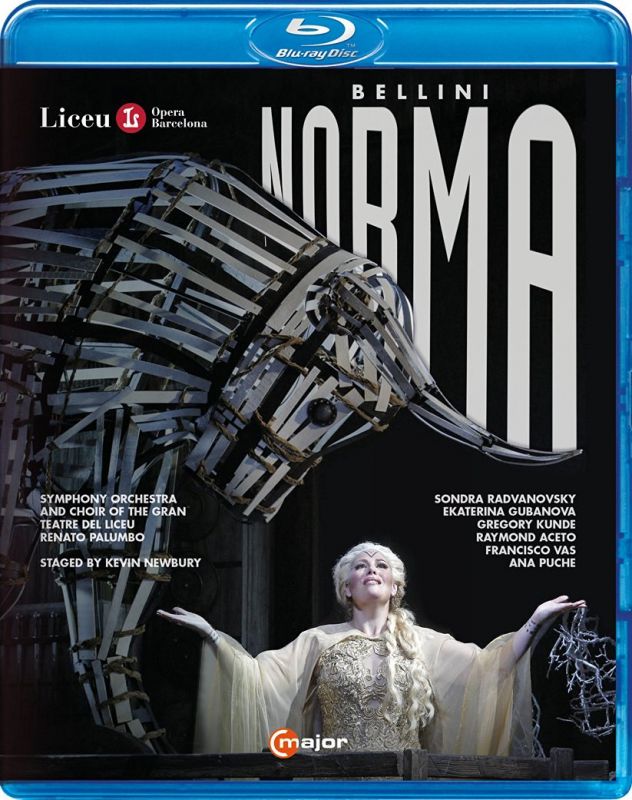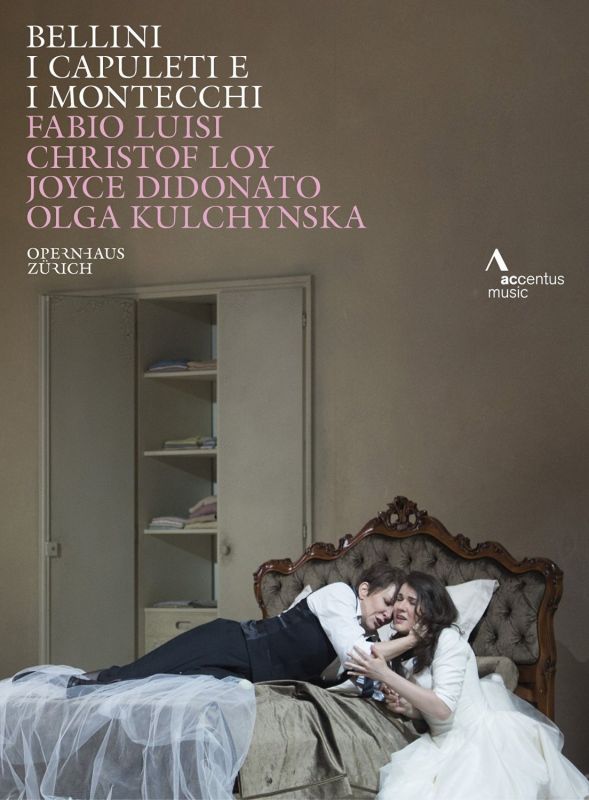BELLINI I Capuleti e I Montecchi; Norma
View record and artist detailsRecord and Artist Details
Composer or Director: Vincenzo Bellini
Genre:
Opera
Label: C Major
Magazine Review Date: 12/2016
Media Format: Blu-ray
Media Runtime: 176
Mastering:
DDD
Catalogue Number: 737 304

Tracks:
| Composition | Artist Credit |
|---|---|
| Norma |
Vincenzo Bellini, Composer
Ana Puche, Clotilde, Soprano Ekaterina Gubanova, Adalgisa, Mezzo soprano Francisco Vas, Flavio, Tenor Gregory Kunde, Pollione, Tenor Liceu Grand Theatre Chorus Liceu Grand Theatre Symphony Orchestra Raymond Aceto, Oroveso, Bass Renato Palumbo, Conductor Sondra Radvanovsky, Norma, Soprano Vincenzo Bellini, Composer |
Composer or Director: Vincenzo Bellini
Genre:
Opera
Label: Accentus
Magazine Review Date: 12/2016
Media Format: Digital Versatile Disc
Media Runtime: 139
Mastering:
DDD
Catalogue Number: ACC20353

Tracks:
| Composition | Artist Credit |
|---|---|
| (I) Capuleti e i Montecchi |
Vincenzo Bellini, Composer
Alexei Botnarciuc, Capellio, Bass Benjamin Bernheim, Tebaldo, Tenor Fabio Luisi, Conductor Gieorgij Puchalski, Companion, Bass-baritone Joyce DiDonato, Romeo, Mezzo soprano Olga Kulchynska, Juliet, Soprano Roberto Lorenzi, Lorenzo, Bass-baritone Vincenzo Bellini, Composer Zurich Opera House Chorus Zurich Philharmonia |
Author: Neil Fisher
With men in ballgowns, silent extras roaming the stage and a revolving house of horrors, the surprise of Christof Loy’s production of I Capuleti e i Montecchi is how it respects the lachrymose beauty of the music while injecting the drama with an extra shot of pathos. Discussing the death-wish of the opera’s two principals, Loy has compared this opera to Tristan und Isolde, and, together with set and costume designer Christian Schmidt, he creates a deeply pessimistic, dreamlike world.
Forget Shakespeare. Bellini telescopes the action on to the two lovers, their fruitless dreams and final hours. Loy turns the screw by suggesting their romance may be more about escape than passion. The Capulet mansion, where we stay throughout, is a dead end, wasted by private and public warfare – of the mafia-gangster variety rather than featuring breeches and sabres. Death becomes the only way out.
Unspoken memories bubble up from the surface in surreal touches, one of which is an androgynous man who glides around exuding menacing vibes – he gives Giulietta the fatal potion. These touches are disconcerting but not wilful. As the double tragedy looms closer, Benjamin Bernheim’s Tebaldo sings of a ‘terrible presentiment’; Loy and Schmidt accordingly bring past and present together, hinting at the terrible things that happened before curtain-up: abuse, guilt and scarring. Only occasionally does Loy overfill this minutely detailed canvas.
Zurich Opera’s cast and conductor jump on board with admirable commitment. Fabio Luisi boldly sculpts the cantabile phrases without getting bogged down, and the orchestral playing is evocative, with pungent contributions from the winds. Of the bit-parts – in this opera, they really are – Alexei Botnarciuc’s Capellio fulminates effectively, Bernheim brings conflicted ardour to Tebaldo, and Roberto Lorenzi offers compassionate mercy as Lorenzo, if via a slightly muffled bass.
Yet Zurich really strikes gold with the triumphant pairing of Joyce DiDonato as Romeo and Olga Kulchynska as Giulietta. DiDonato’s clothes and wig give her an unfortunate resemblance to Barbra Streisand’s Yentl, but the American mezzo is ferociously ardent and her attention to textual detail superb. Her denouement is tremendously affecting. Kulchynska’s youth is only part of the reason why the talented Ukrainian is so moving here. She jumped into this show late but the production looks like it was mounted around her portrait of a lost, wounded soul, and she sings with silvery vulnerability.
Norma, filmed at the Liceu, hits few of the same targets. It’s a scrappy, strenuous affair, the cameras catching in close-up the nervousness of choral singers and principals alike who are struggling to join the dots. I share their confusion.
Perhaps it’s best to focus on the star. She is Sondra Radvanovsky, a soprano who has come relatively late to the touchstone bel canto roles – previously she was better known for heavier Verdi roles – but scores a triumph here. A few intonation lapses don’t detract from the intelligent and imaginative way in which she shapes both recitatives and arias, rising to fervent climaxes as well as silken, ethereal pianissimos.
Yes, her ‘Casta diva’ is dispatched with juicy flair, but it’s in the preceding lines that the soprano really shows her mettle. Here Radvanovsky astutely establishes Norma’s divided loyalties rather than affecting to channel the voice of divine ‘Irminsul’. Indeed, perhaps underneath the Medusa wig, Mad Max tattoos and an apricot gown that Margot Leadbetter from The Good Life would covet is a nuanced portrayal of a woman who has long since abandoned her faith for political expediency and, in so doing, has lost her way.
Sadly, Kevin Newbury’s inexplicably well-travelled production gives her nothing to develop this idea (or replace it with something else). Aspiring to a mythic or timeless quality, Newbury’s staging mostly channels new-age hokum. The giant barn of a set (designs by David Korins) is unhelpful: sometimes it’s a temple, sometimes it’s Norma’s secret rooms, but the giant cow skulls on the walls better suggest a Kentucky barbecue joint. Gregory Kunde’s Pollione seems to have free access to the Gauls’ secret rites, which makes the opening scenes even more opaque. There’s little sense of claustrophobia, of an occupied people, or of Norma’s double life.
Renato Palumbo is sensitive to mood and colour but doesn’t shape the music urgently or theatrically enough; fold in the woolly stagecraft and the Act 2 scene for the chorus and Oroveso (Raymond Aceto, a little bland) almost brings things to a complete halt. Good support comes from Kunde’s Pollione, delivered with style and vigour, and Ekaterina Gubanova’s Adalgisa, sympathetic if lacking tonal variety. Radvanovsky deserves a grander sparring partner.
Discover the world's largest classical music catalogue with Presto Music.

Gramophone Digital Club
- Digital Edition
- Digital Archive
- Reviews Database
- Full website access
From £8.75 / month
Subscribe
Gramophone Full Club
- Print Edition
- Digital Edition
- Digital Archive
- Reviews Database
- Full website access
From £11.00 / month
Subscribe
If you are a library, university or other organisation that would be interested in an institutional subscription to Gramophone please click here for further information.




